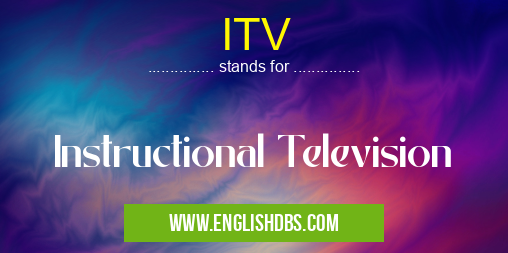What does ITV mean in NEWS & MEDIA
Instructional Television (ITV) is a type of educational programming broadcast through television technology. ITV was originally used to provide instruction and learning in colleges and universities, but has since expanded to include other educational applications. It is often used to deliver distance education courses directly to the home or school of students who are unable to physically attend class due to geographical reasons.

ITV meaning in News & Media in Community
ITV mostly used in an acronym News & Media in Category Community that means Instructional Television
Shorthand: ITV,
Full Form: Instructional Television
For more information of "Instructional Television", see the section below.
Benefits Of ITV
Using instructional TV provides a number of benefits which make it an attractive option for educators or trainers looking for efficient ways to disseminate their course material across large distances. For instance, television provides visual cues such as graphics and diagrams that can help illustrate complex concepts in an easily understandable format. Additionally, ITV allows instructors or trainers to remotely monitor student progress in order to tailor the delivery of content effectively and keep them engaged during the lesson. It also tends to have higher rates of retention compared with printed materials.
Drawbacks Of ITV
It should be noted that there are certain drawbacks associated with using instructional TV as well; namely cost and access restrictions. The majority of televised content requires specialized equipment in order to receive it which can be expensive for educators and trainers who wish to use it in their programs. There are alternative services such as streaming media which can help offset these costs somewhat but require access to reliable high-speed internet services which may not be widely available in some areas. In addition, traditional broadcast signals are typically limited by geographic boundaries.
Essential Questions and Answers on Instructional Television in "COMMUNITY»MEDIA"
What is Instructional Television?
Instructional television (ITV) consists of the use of television broadcasting in educational instruction. It typically has a two-way communication component, allowing for interaction between a teacher and students. ITV programming can range from broadcast lectures, live videoconferencing, or even pre-recorded content.
When did ITV become popular?
In the early 2000s, extensive use of ITV started becoming more commonplace due to the increasing availability and affordability of digital internet technologies which made it accessible to larger audiences.
What types of instruction does ITV provide?
ITV provides instruction in higher education areas such as liberal arts, sciences, math, and engineering as well as professional programs such as business management and health care. It also offers an environment for students to interact with their instructors in real-time, which furthers the interactive nature of the educational program.
How does ITV facilitate collaboration between teachers and students?
Through its two-way communication components, teachers are able to give feedback to students on an individual basis via video conferencing or by giving their class assignments that they can complete together online in real-time. Furthermore, ITV allows for easy access to different multimedia resources and external sites which helps make learning much more engaging and enjoyable for both teachers and students alike.
How does one obtain an instructional television program?
Depending on the institution's capability and budget, various media outlets may be used to broadcast an instructional television program. Institutions may choose cable TV providers like BBC or NBC for nationwide coverage or opt for local cable companies if within their area coverage if they want only a certain population to view it.
Are there any setup requirements for using instructional television programming?
Yes. Many forms of instructional television programming require technical setup before they can be used in any educational setting. Requirements may include camera set-up (external or internal), software installation/configuration (like Microsoft Teams), upload/download speeds compatibility checks etc., so proper guidance must be followed prior to usage.
What are some benefits of using Instructional TV over traditional lecture methods in terms of knowledge retention?
Studies suggest that Instructional TV can help retain knowledge better than traditional lecture methods due to its ability to combine visual imagery with audio to help reinforce concepts better as compared to relying solely on audio only lecture methods alone.
Is Instructional TV suitable for all subject matters or just certain ones?
While there are certainly some subject matters that would benefit better from Instructional TV than others like STEM fields (Science Technology Engineering And Mathematics) due its reliance on visuals over audio alone; but Instructional TV can also be used successfully in Humanities study subjects as well because it takes advantage of interactivity over passive lectures.
Final Words:
In conclusion, Instructional Television (ITV) is a type of educational programming utilizing television technology that can be used for a variety of purposes including higher education instruction and corporate training programs among others. Although there are some downsides regarding cost and access considerations when implementing this solution, its ability to reach wide audiences across large distances makes it an attractive option for many educators and trainers who are looking for effective ways of delivering their course material.
ITV also stands for: |
|
| All stands for ITV |
